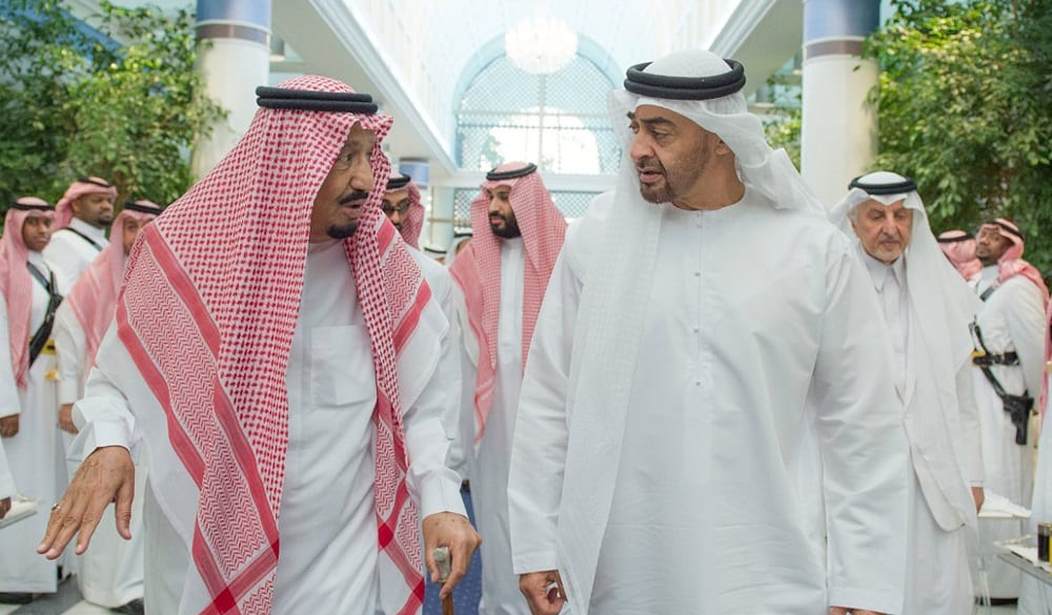
David Barrows, center, with Code Pink, wears a mask of Saudi Arabia Crown Prince Mohammed bin Salman during a protest outside of the Embassy of Saudi Arabia about the disappearance of Saudi journalist Jamal Khashoggi, Wednesday, Oct. 10, 2018, in Washington. (AP Photo/Jacquelyn Martin)
Can the relationship between the United States and Saudi Arabia survive much more of this? With the shooting at a naval base in Pensacola, Fl, looking more and more like an act of radical Islamic terrorism, it appears that the ties between the two nations are again being tested.
The fact that the shooter was a member of the Saudi military is bound to raise certain questions despite Riyadh’s insistence that they had nothing to do with the attack. To make matters worse, six other Saudis were arrested in connection to the shooting.
In other words, it doesn’t look good.
Shortly after the news broke regarding the shooter’s identity and nationality, Saudi King Salman rushed to call President Trump to smooth things over. The Saudi embassy released a statement stating that the monarch reached out to Trump to “express his sorrow and grief.” In a tweet, the president indicated that Salman insisted that the perpetrator “in no way shape or form represents the feelings of the Saudi people.”
Of course, there was also the obligatory pledge to offer their security services to help U.S. authorities with the investigation. Let’s put this simply: The Saudis are engaging in damage control. After the flare-up that came from the murder of Saudi journalist Jamal Khashoggi, this incident is causing yet another headache for the Saudi leadership.
Let’s not forget that most of the terrorists who carried out the 9/11 terror attacks as well. There is no doubt that U.S./Saudi relations are tenuous, to say the least. American officials are now asking for answers from Riyadh.
Rep. Matt Gaetz (R-FL) released a video yesterday stating that the shooting was an “act of terrorism,” and called for “extreme vetting” of foreign nationals — especially individuals who are allowed to train on U.S. military bases.
Florida Governor Ron DeSantis stated that the Saudis will owe restitution to the victims of the shooting. “The government of Saudi Arabia needs to make things better for these victims, and I think they’re going to owe a debt here, given that this is one of their individuals.”
It appears that Trump does not wish for this incident to interfere with U.S. dealings with Saudi Arabia. He seems to be running interference for their government and attempting to assure the American public that Riyadh did not cause this attack through his tweet.
Many on both the left and the right have questioned America’s alliance with the Saudi royal family. Of course, there are several reasons for their skepticism. Some cite Riyadh’s blatant human rights abuses as an example of why we should not align with a country that clearly does not share our values.
Others have cited the brutal war in Yemen which has resulted in the deaths, displacement, and oppression of thousands of people. It wasn’t too long ago that Congress attempted to halt the sale of weapons to the Saudi government that would be used to kill civilians in Yemen.
But others argue that while the Saudi government does not share our values, they are an inconvenient necessity in the effort to prevent Iran from amassing more power in the Middle East. Iran’s increasingly hostile actions in the regions, including its involvement in attacks on two Saudi oil facilities, as well as military actions against tankers in the Straits of Hormuz could lend credibility to that assertion.
But what seems to be most at issue is Saudi Arabia’s exportation of the Wahhabist Islamic ideology that serves as the foundation for the world’s most dangerous extremist terrorist organizations. In the past, Riyadh has been responsible for funding mosques across the globe that preach this violent ideology. Wahhabism is a strict interpretation of Islamic law that governs Saudi Arabia and communities around the world. But it also promotes a violent version of Islam that calls on believers to wage jihad — holy war — against non-believers.
There does not appear to be evidence that the Saudi royal family has curtailed the exportation of this extreme ideology. When President Trump first interacted with the Saudi government, he urged them to weed out the extremist elements in the country. Saudi Crown Prince Mohammed bin Salman has implemented some reforms. But it does not appear that the administration is intent on holding his feet to the fire on this issue. But unfortunately, this issue won’t go away on its own.
The fact that ISIS has been largely defeated in the Middle East does not mean that they are not still a danger. Moreover, it also does not mean that other terrorist groups like Al Qaeda and Hezbollah are not still operational; in fact, these organizations are still quite active. U.S. authorities recently sentenced a Hezbollah operative for scouting out potential sites for attacks.
Perhaps military strikes are not the only way the U.S. will need to fight Islamic terrorism; the Trump administration must also focus on destroying the ideology that spawns these violent acts. Otherwise, this could be a neverending conflict.
What do you think? Let me know in the comments below!
Follow me on Twitter: @JeffOnTheRight












Join the conversation as a VIP Member